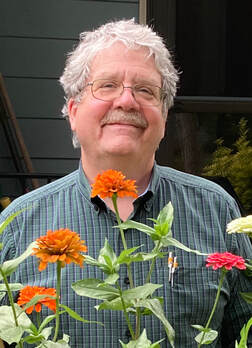J.S. Absher
POET - Editor/Publisher - IndepenDEnt Scholar

A Theory of OriginsPeople sometimes ask where an artist’s ideas come from. It’s a hard question to answer; “it depends” is probably the most accurate answer, though hardly illuminating to the questioner.
On a few blessed occasions, the answer is, “from everywhere.” I like this comment from a letter by Elizabeth Bishop to her friend, Robert Lowell: Your poems “have that sure feeling, as if you’d been in a stretch … when everything and anything suddenly seemed material for poetry—or not material, seemed to be poetry, and all the past was illuminated in long shafts here and there, like a long-waited-for sunrise. If only one could see everything that way all the time! It seems to me it’s the whole purpose of art, to the artist (not to the audience)—that rare feeling of control, illumination—life is all right, for the time being.” (Elizabeth Spires, "One life, one art: Elizabeth Bishop in her letters,” https://newcriterion.com/issues/1994/5/one-life-one-art-elizabeth-bishop-in-her-letters) An amusing side note comes from Cole Porter’s many stories explaining the origins of “Night and Day” (see William McBrien, Cole Porter, 1998). I’ve captured his various accounts, with poetic license, in my poem, “Theories of Origin,” recently published in Skating Rough Ground: Theories of Origin Zanzibar, ’35-- a little hotel, a patio, ivory dealers in burnouses, the barkeep simpatico, a round on the house, night and day the phonograph playing Night & Day while Porter’s in the corner saying I wrote that in a taxi in the roar of the traffic-- no, at lunch with the Astor’s in Newport, when it was raining drip drip drip—but no, it wasn’t so prosaic-- I took the wife (no, lover) to the starry mosaic vault of a mausoleum-- no no no, it was the plaintive cry of the muezzin from a mosque in Morocco-- and no it doesn’t matter darling where it was on the Black Sea or a bus’s backseat—doesn’t matter if in a bar in Zanzibar or on far out Antares or in patent dancing shoes under a nightclub moon. That’s the best answer perhaps—it doesn’t matter. |
Elizabeth Bishop in Brazil in 1964. Public domain (source: https://en.wikipedia.org/wiki/Elizabeth_Bishop#/media/File:Elizabeth_Bishop,_1964.jpg)
|
A Song |
|
A poem for the sycamore,
a sycamore for the snake that swims in the shallows sheltered by its roots, roots for the land, to hold it in place, land for the sycamore, on whose long thick limb we’ve lain cantilevered over the river in shade, shade as blue as a jay’s feathers and free to all comers. * * * A poem for board feet standing in a mane of leaves fluttered by air of their own making, air for poet and spouse, poet and spouse for each other and land and snake and river and sycamore, sycamore for the leaves, leaves for the air, air for the song of marriage we are singing. * * * Those who venture off trail-- booted against snakes, whistling Colonel Bogey’s March, surveyor’s maps rolled underarm-- see dimity patterns the roots make on ground checkered with shadow and light, and with every step are wary: clutters of leaves may strike, the stepped-on stick bite back. * * * Those tongues flicker to find us out, warm-blooded calculators who fell and bark, slab and mill through knot and burl till the tree of knowledge is pollarded and bare, a lacquered coat rack where perch the birds of abstraction. * * * This sycamore rising dog-legged-- or is it a god’s leg, or that of a god’s horse straining the wooden musculature to rear against the bit?-- is hard to fix in words that do not hobble the power, but when saw and dozer cut their buck and wing, easy to reckon the board feet. * * * By this border of blooming surveyor’s flags in weeks we’ll step arm in arm then do-si-do over hardwood; on a bed as wide as a pond glimpse in our dreams afternoons that stretched a heron’s wing over the river in woods whose high crowns for us have been lopped and pulped * * * and made into this paper on whose void the words elusive as a swarm of gnats reeling and spinning bless our reading chair, our table where a boy not long from Africa types the home row letters: lads fall; all sad lads; half sad half glad: all fall; * * * bless the safe place we have made, the wooden bowl on the table, the fruit that fills it, the gnats eating the ripe fruit, the fruit of prayer and meditation; and bless the headboard in whose shadow we dream the tree whose fruit we are—logger, surveyor, poet and spouse, lads: same tree, same fruit. Published in Mouth Work (St. Andrews University Press, 2016) |
Hope, by Cynthia Reeves (1979)
|
ANYCE SHEPHERDThe murder of her deputy sheriff husband in 1938 begins my grandmother's fifty-year widowhood.
|
NIGHT WEATHERThe quietness of haiku in a book designed and profusely illustrated in color by Katie LaRosa.
|
MOUTH WORKPrize-winning poems on the power of language and love.
|
MISSISSIPPI LAWYERLove letters from a crafty lawyer, William Maybin.
|
|
Trying to Break Through, Cynthia Reeves, 1984.
|
Trying to Break ThroughEvery writer dreams of breaking through - to a deeper, richer language; to a greater understanding of the world; to an appreciative, buying audience. This painting by Cynthia Reeves expresses that longing, as well as the commitment to continue even if the breakthrough remains elusive.
|